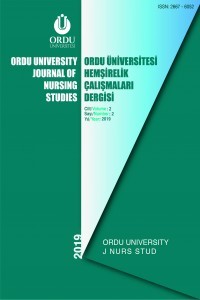
Ordu Üniversitesi Hemşirelik Çalışmaları Dergisi
Yazarlar: Mehtap GÜMÜŞAY, Nülüfer ERBİL
Konular:Hemşirelik
Anahtar Kelimeler:Menopause attitude,Menopause specific quality of life,Woman
Özet: Objective: This study was conducted to investigate the effect of attitudes towards menopause on menopause-specific quality of life among 45 years and older women. Method: This descriptive study included 197 women who applied to the gynecology outpatient clinics of an educational research hospital in the Black Sea Region and agreed to participate in the study. The personal questionnaire prepared by researchers, Menopause Specific Quality of Life Scale (MENQOL) and Attitudes Towards Menopause Scale were used to collect data. Descriptive statistical methods, t test, One way ANOVA test, Mann-Whitney U test and Kruskal Wallis test were used in the evaluation of the data. Results: It is determined that average age of the women was 50.92 ±4.71, body mass index of 41.6% of women were "overweight". 63.5% of the participants were menopausal and 16% of them were surgically menopausal. It was determined that 54.8% of the women had information about menopause, 42.1% went to the doctor for menopause, and 31.5% smoked. The problems most affecting the menopause specific life quality of women were feeling a lack of energy, decrease in physical strength, difficulty sleeping, aching in muscles and joint, feeling tired and worn out. The mean score of the women's attitude towards menopause was 36.06 ± 7.34 (range 18-56) and 72.1% of them had negative menopause attitude. Women with negative menopausal attitudes had higher scores from MENQOL and sub-domains, and differences in psychosocial and physical sub-domains scores and MENQOL scores were statistically significant (p = 0.003, p = 0.004, p = 0.003, respectively), but differences in vasomotor and sexual sub-domains scores were not statistically significant (p> 0.05). Conclusion: It was found that the majority of women over 45 years of age had negative menopause attitude. Menopause specific quality of life of women with negative menopause attitude were affected negatively.